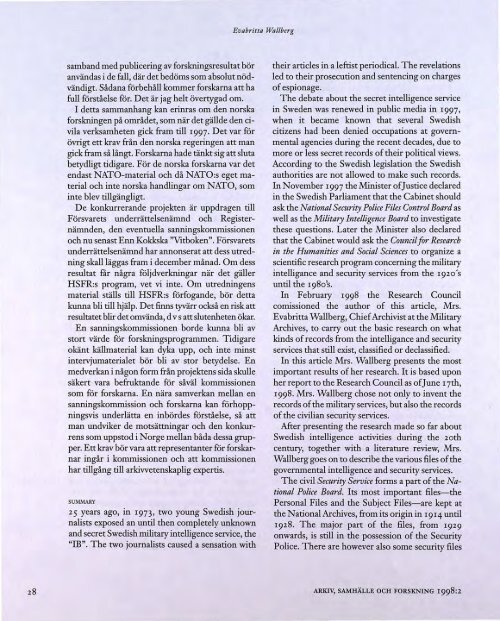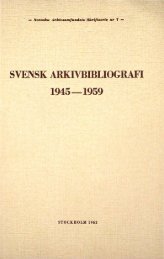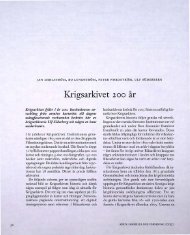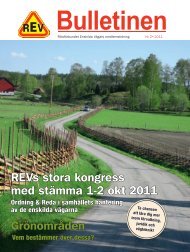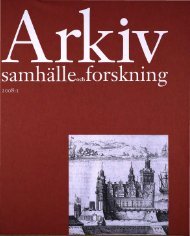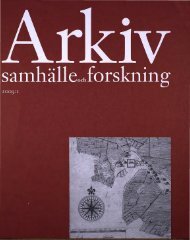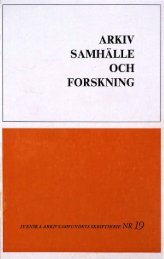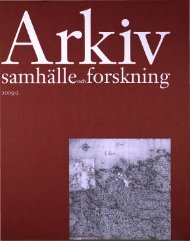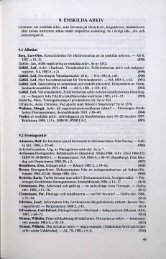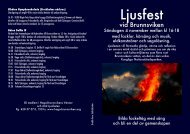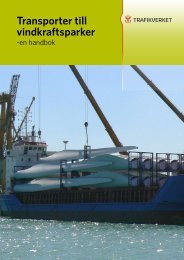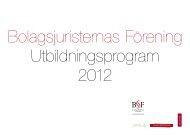Redaktionen har ordet - Visa filer
Redaktionen har ordet - Visa filer
Redaktionen har ordet - Visa filer
Create successful ePaper yourself
Turn your PDF publications into a flip-book with our unique Google optimized e-Paper software.
Evabritta Wallberg<br />
samband med publicering av forskningsresultat bör<br />
användas i de fall, där det bedöms som absolut nödvändigt.<br />
Sådana förbehåll kommer forskarna att ha<br />
full förståelse för. Det är jag helt övertygad om.<br />
I detta sammanhang kan erinras om den norska<br />
forskningen på området, som när det gällde den civila<br />
verksamheten gick fram till 1997. Det var för<br />
övrigt ett krav från den norska regeringen att man<br />
gick fram så långt. Forskarna hade tänkt sig att sluta<br />
betydligt tidigare. För de norska forskarna var det<br />
endast NATO-material och då NATO:s eget material<br />
och inte norska handlingar om NATO, som<br />
inte blev tillgängligt.<br />
De konkurrerande projekten är uppdragen till<br />
Försvarets underrättelsenämnd och Registernämnden,<br />
den eventuella sanningskommissionen<br />
och nusenastEnn Kokkska ''Vitboken". Försvarets<br />
underrättelsenämnd <strong>har</strong> annonserat att dess utredning<br />
skallläggas fram i december månad. Om dess<br />
resultat får några följdverkningar när det gäller<br />
HSFR:s program, vet vi inte. Om utredningens<br />
material ställs till HSFR:s förfogande, bör detta<br />
kunna bli till hjälp. Det finns tyvärr också en risk att<br />
resultatet blir det omvända, d v s att slutenheten ökar.<br />
En sanningskommissionen borde kunna bli av<br />
stort värde för forskningsprogrammen. Tidigare<br />
okänt källmaterial kan dyka upp, och inte minst<br />
intervjumaterialet bör bli av stor betydelse. En<br />
medverkan i någon form från projektens sida skulle<br />
säkert vara befruktande för såväl kommissionen<br />
som för forskarna. En nära samverkan mellan en<br />
sanningskommission och forskarna kan förhoppningsvis<br />
underlätta en inbördes förståelse, så att<br />
man undviker de motsättningar och den konkurrens<br />
som uppstod i Norge mellan båda dessa grupper.<br />
Ett krav bör vara att representanter för forskarnar<br />
ingår i kommissionen och att kommissionen<br />
<strong>har</strong> tillgång till arkivvetenskaplig expertis.<br />
SUMMAR Y<br />
25 years aga, in 1973, two youngSwedish journalists<br />
exposed an until then completely unknown<br />
and secret Swedish military intelligence service, the<br />
"IB". The two journalists eaused a sensation with<br />
their artides in a leftist periodical. The revelations<br />
led to their proseentian and sentencing on c<strong>har</strong>ges<br />
of espionage.<br />
The debate about the secret intelligence service<br />
in Sweden was renewed in public media in 1997,<br />
when it became known that several Swedish<br />
citizens had been denied occupations at governmental<br />
agencies during the recent decades, due to<br />
more or less secret records of their political views.<br />
According to the Swedish legislatian the Swedish<br />
authorities are not allowed to make such records.<br />
In November 1997 the Minister of]ustice d edared<br />
in the Swedish Parliament that the Cabinet should<br />
ask the National Security Police Piles Control Board as<br />
weil as the Military lntelligence Board to investigate<br />
these questions. Later the Minister also dedared<br />
that the Cabinet would ask the Council for Research<br />
in the Humanities and Social Sciences to organize a<br />
scientific research program conceming the military<br />
intelligance and security services from the 192o's<br />
until the 198o's.<br />
In February 1998 the Research Council<br />
cornissioned the author of this artide, Mrs.<br />
Evabritta Wallberg, Chief Archivist at the Military<br />
Archives, to carry out the basic research on what<br />
kinds of records from the intelligance and security<br />
services that still exist, dassified or dedassified.<br />
In this artide Mrs. Wallberg presents the most<br />
irnportant results of her research. lt is based upon<br />
her report to the Research Council as of] une r 7th,<br />
1998. Mrs. Wallberg chose not only to invent the<br />
records of the rnilitary services, hut also the records<br />
of the civilian security services.<br />
After presenting the research made so far about<br />
Swedish intelligence activities during the 2oth<br />
century, tagether with a literature review, Mrs.<br />
Wallberg goes on to describe the various files of the<br />
govemmental intelligence and security services.<br />
The civil Security Service forms a part of the National<br />
Police Board. lts most irnportant files-the<br />
Personal Files and the Subject Files-are kept at<br />
the NationalArchives, from its origin in 1914 until<br />
1928. The major part of the files, from 1929<br />
onwards, is still in the possession of the Security<br />
Police. There are however also same security files<br />
ARKIV, SAMHÄLLE OCH FORSKNING 1998:2


